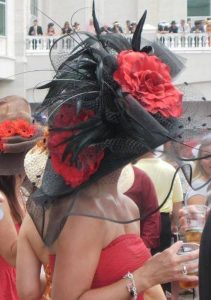 He knew he lacked credibility. After all, how could anyone think that a 30-something man, hailing from the City’s affordable housing units, should be designated as the events manager for a Ladies Cotillion and fashion show. But there was no one else now that the Director of Special Events quit and decided to backpack across some remote locale for three months with her boyfriend of as many months. Yet there he was, hunched over his ill-fitting desk, after-hours, listening to iTunes whilst feverishly googling “kitten heel, pump, gingham, damask, sarong, pareo.” The learning curve was daunting.
He knew he lacked credibility. After all, how could anyone think that a 30-something man, hailing from the City’s affordable housing units, should be designated as the events manager for a Ladies Cotillion and fashion show. But there was no one else now that the Director of Special Events quit and decided to backpack across some remote locale for three months with her boyfriend of as many months. Yet there he was, hunched over his ill-fitting desk, after-hours, listening to iTunes whilst feverishly googling “kitten heel, pump, gingham, damask, sarong, pareo.” The learning curve was daunting.
After all, the 400 women scheduled to sip Bellinis whilst shopping under a tent on a Long Island wine-estate depended upon him knowing the difference. He was instructed by the Lululemon-clad co-chairs at yesterday’s committee meeting that it would be an “utter travesty” if two vendors with similar merchandise were too close to one another. Juggling personalities was never a problem for him. Nor was hard work. But his skill–set bent toward the written word, getting to know his supporters, and inspiring people to bleed for a cause. Not this. This was different.
He felt lost. Alone. At every pair of shoes he identified and vendor he assigned into a corner, he questioned this moment.
At yesterday’s meeting, the event co-chairs and their feverish entourage were talking over Venti Mocha Lattes about beaded sustainably-made jewelry, created in an African Village through a micro-lending project that “inspired” female-owned collaborative businesses. Someone suggested a line of fragranced soaps hand-made by developmentally disabled women in Appalachia. And, yet, no one discussed these women. What was their day like? How much money are they making with this bracelet or this bar of soap? Is it enough to support their family? Will it be enough tomorrow or next year? He felt like the event committee was trying on pithy causes to see which one looked best against their well-tended skin.
He questioned whether they even cared about what they were raising money for — poor, young mothers struggling to regain control of their lives after experiencing the terror of domestic violence. These women who were supposed to be celebrated for their spirit and courage, remained unseen, despite the elaborate efforts of the event committee. They may have well been raising funds for a bucolic farm where former circus elephants frolic for the remainder of their lives. No doubt he was the assigned ringleader regardless of the cause–maybe that’s why he kept seeing elephants. He imagined his assigned task, “know your vendors, pair accordingly, don’t mix in bad form.” He considered the fate of a small, furry mammal against a python. Keep the animals in their respective cages, and like the great OZ, Jon, stay behind the curtain. His circus was cinematic in scope.
As he started to research bags, he thought about the nature of philanthropy and that it was often not quite for the enlightened purpose that was regularly championed. If artists’ works in the 14th century were commonly commissioned as a superhighway for wealthy patrons to purchase a seat in heaven, clearly the Cotillion was a 21st century version of folks still vying for a seat somewhere through enormous wealth and influence.
Surely, these sort of ethical vagaries have plagued philanthropy for years, and greater minds than his — de Tocqueville, Rousseau, and Drucker included — contemplated that fine line. But none of their musings helped him with his appointed task. All he kept coming back to was the advice his first boss, a grizzled Director of Development with a penchant for cigars, offered five minutes before his first Gala: “No matter what happens, no matter the drama or self-destruction, our job is to make the event chair and the committee look good. If she forgets her speech, you have a backup. If she wants an eleventh at her table of ten, you find an extra chair. And if she’s had one too many proseccos, you grab her some coffee.”
“Gold Guns Girls” by Metric came up on his shuffle. He considered Emily’s question, “Is it ever gonna be enough?” and resigned himself to the reality that in the accounting that truly matters, it was impossible to make the committee look good no matter how many times he googled tea party bonnets.
All he could do was bring coffee to the event.
– Jon and Sarah
